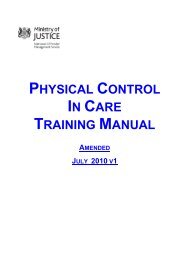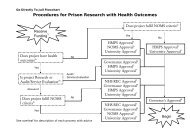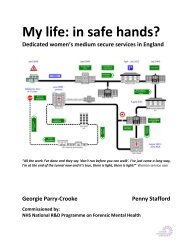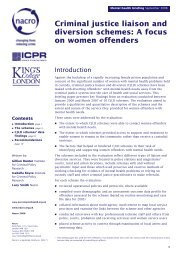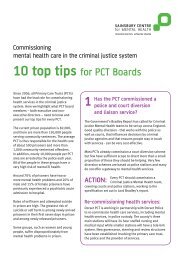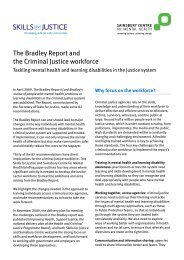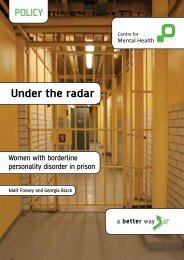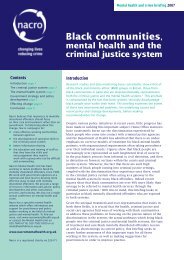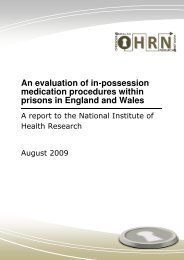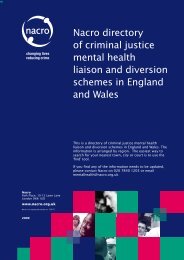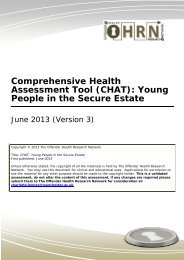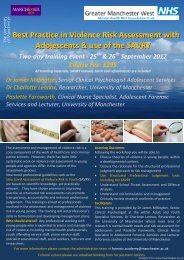Engendering Justice - from Policy to Practice - The Fawcett Society
Engendering Justice - from Policy to Practice - The Fawcett Society
Engendering Justice - from Policy to Practice - The Fawcett Society
- No tags were found...
Create successful ePaper yourself
Turn your PDF publications into a flip-book with our unique Google optimized e-Paper software.
isk assessments are not uniform. In one region, the riskassessment is 75 pages long.• <strong>The</strong> acceptance of ISVAs within the court system alsodiffers between areas, with some Courts allowing ISVAs <strong>to</strong>sit in the court while in other areas they are required <strong>to</strong> sitin the public gallery.• In order for victims <strong>to</strong> have confidence in ISVAs, therole must be independent <strong>from</strong> the police and healthauthorities. However, there are plans for the managers ofSARCs <strong>to</strong> be responsible for the management of ISVAsas well as some ISVAs working out of police and healthsettings.Multi-Agency Risk Assessment Conferences (MARACS)have become the corners<strong>to</strong>ne of the Government’sapproach <strong>to</strong> high-risk victims of domestic violence. <strong>The</strong>Government has now funded over 100 MARACS and <strong>from</strong>1 April 2007 <strong>to</strong> 31 March 2008, almost 12,000 cases werebrought <strong>to</strong> MARACS. 181 MARACS have the potential <strong>to</strong>assist, with preliminary data supplied by some MARACareas in 2008 indicated a 50 percent overall reduction inrepeat victimisation among cases heard at the MARAC.However, the Commission has a number of concernsabout the current operation of the conferences. Forexample, the Commission was <strong>to</strong>ld that many workersconnected <strong>to</strong> MARACs lack training in domestic violenceissues and sensitivities. Further, there are concerns thatthe conferences may be frequently breaching a woman’sright <strong>to</strong> privacy through defects in consent proceduresand follow-ups. <strong>The</strong> Commission was <strong>to</strong>ld of a particulardiscussion within a MARAC in which it was decided that awoman would be given a warning that if she did not leaveher partner, her children would be removed. This approach,rather than providing support for women, is likely <strong>to</strong> ensurethey do not seek help if the violence recurs. <strong>The</strong>se issuesneed <strong>to</strong> be taken seriously through an independent audit ofMARAC processes, with priority given <strong>to</strong> the experiencesof women whose cases are presented and <strong>to</strong> independentwomen’s organisations.<strong>The</strong> national Witness and Victim Evaluation Survey (‘WAVE’)measures the satisfaction of witnesses and victims butsignificantly excludes victims of rape, sexual assault anddomestic violence. While the British Crime Survey includessome relevant questions on VAW, the current format doesnot allow for the collection of detailed information <strong>from</strong>VAW victims who have reported crimes. <strong>The</strong>re is a needfor a national moni<strong>to</strong>ring system <strong>to</strong> be developed so thatthe various targets of the criminal justice agencies are notpurely conviction rate driven.Steps are currently being taken <strong>to</strong> develop such a measure.<strong>The</strong> Home Office Violent Crime Unit has funded a feasibilitystudy on surveying the satisfaction of victims of serioussexual offences within the criminal justice system. It isanticipated that a report on this study will be available inMay 2009. Further, in August 2008, a steering group led byCPS was set up <strong>to</strong> lead a project <strong>to</strong> develop methodologies<strong>to</strong> measure support, safety and satisfaction of victims ofviolence against women in the criminal justice system. Thisinitial work of this project, culminating in an anticipated pilotin September 2009, is promising, with detailed assessmentbeing conducted of current national and internationalmeasurement methods.No Recourse <strong>to</strong> Public FundsWomen fleeing domestic violence, with an insecureimmigration status and therefore no recourse <strong>to</strong> publicfunds cannot access any kind of emergency or socialhousing. In 2008, the CEDAW Committee singled out,protection of women with no recourse <strong>to</strong> public funds,female asylum seekers and women refugees as an issueunder which the United Kingdom is failing <strong>to</strong> live up <strong>to</strong> itsobligations under CEDAW. In 2006/7 within London, 18 DVrefuges had <strong>to</strong> turn away 222 requests for services <strong>from</strong>women with no recourse <strong>to</strong> public funds. 182<strong>The</strong> Commission has consistently highlighted this issue andcommends the work of organisations, such as SouthallBlack Sisters, continuing <strong>to</strong> campaign around this issue.Southall Black Sisters, have, with funds provided by LondonCouncils and Oxfam, recently set up a small last resort fundcalled the ‘SBS No Recourse Fund.’Women, who are subject <strong>to</strong> immigration control, should bemade exempt <strong>from</strong> the ‘no recourse <strong>to</strong> public funds’ rulein order <strong>to</strong> ensure there are not discrimina<strong>to</strong>ry responses<strong>to</strong> women suffering violence. This would enable women <strong>to</strong>leave violent situations, access support, report violence andwhere appropriate make use of the domestic violence andimmigration concession.Page 63



